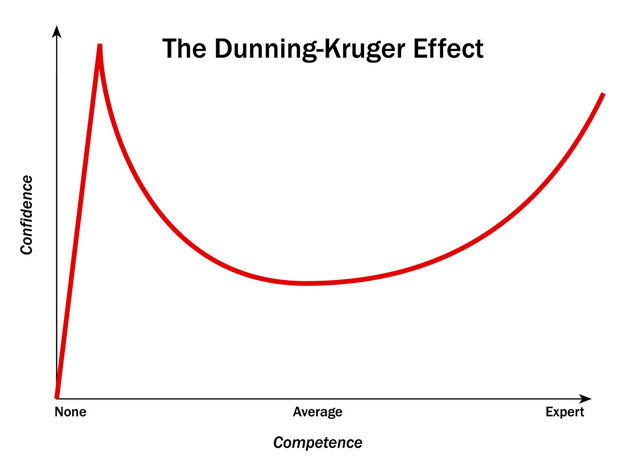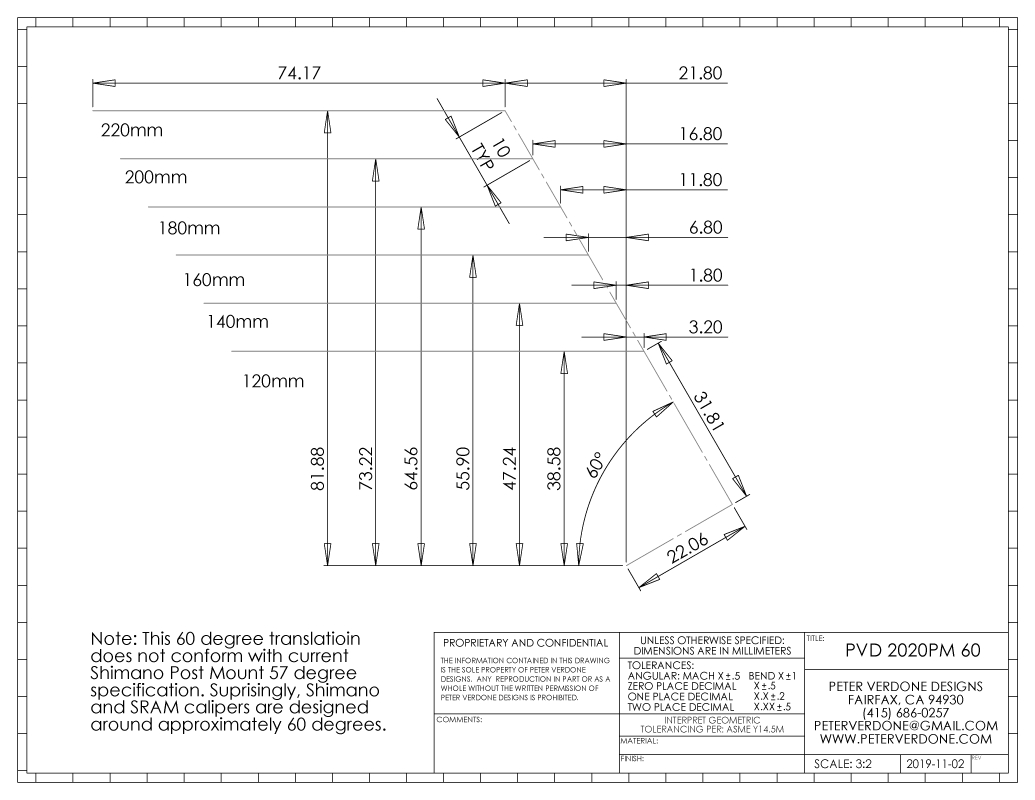This post is about something few people hear but many need to. You are not an expert on bikes. You aren’t. No matter what you’ve convinced yourself of, you’re not. You make YouTube videos, you comment in forums, you go on lots of rides. Still, you really don’t know a lot about bikes. Everyone in the comment section thinks they are an expert. Few are.
Recently, in a discussion on a bicycle frame-builder Facebook group, a common thing happened. A guy named ‘Timm Sima’ (?) started commenting within a thread. This was a thread where a few others and I were trying to help a young kid understand the work he needed to do to plan and build a bicycle frame. The others were very experienced with carrying out all kinds of projects on different scales.
So, this guy ‘Timm’ chimes in with some complete nonsense, showing he had no knowledge of the topic being discussed, and making fool of himself. I corrected him on what we were talking about. Then ‘Mr. Timm’ let loose an apocalypse of stupidity and insults, eventually blocking me and a few other folks who were part of the group. He made a real mess of things and it was especially egregious because he was so completely ignorant of the topic he was commenting on.
‘Timm’ considers himself an expert on bicycles. He’s not. ‘Timm’ is like many people in the bike world. More than common, ‘Timm’ is the rule not the exception. Armed with a few years of mediocre riding experience and a load of magazine articles consumed, he ‘knew’ exactly what he was talking about…but he didn’t. All you have to do is read any of the major bicycle publications or go over to Velocipede Salon, Pinkbike, or MTBR and you will be astounded by how little people understand of even the most basic topics in bicycles. “Really dumb” is not too harsh a descriptor for the general population of self-described bike experts.
Non-expert-experts are the topic for today and I’m talking about something more than just where one thinks they fall on the Dunning-Kruger Effect curve. While the DKE is certainly an important part of understanding one’s location on the path to expertise, I’m also talking about how we evaluate others to determine if they are worth listening to. Who is an expert and who isn’t, as seen from the outside. Are we listening to novices that think they know or experts that know what they don’t know. There’s a ton of bullshit out there, we need to be able to filter it. Easily digestible ‘content’ is usually made by folks that are novice in their understanding.
People in the bicycle world are confused about what makes a person an expert. Riding your bike fast or working at a bike shop doesn’t mean you know anything about bikes to any level of detail. You might know a little more if you work at a marketing company, are a framebuilder, or a pro rider but often not much more. Let’s say you’ve ridden and worked on your own bikes for 30 years? Congratulations, you’re what we call “the consumer”.
This confuses folks because:
Are there people that can repair or assemble a bicycle relatively quickly and without trouble? Yes. These are called technicians.
Are there people that can win World Cup races? Yes. These are called racers.
Are there people that can produce impeccable welds on a titanium bike frame? Yes, these are called welders.
Are there people that can position you on an exercise bike in a studio? Yes, These are called fitters.
Are there people that you see at bicycle trade shows? Yes, these are called marketing shills.
Are there people that write articles in magazines? Yes, these people are called publication shills.
The Internet problem
Prior to the rise of the internet this was a problem, but it wasn’t as great in how quickly bad information spreads. The local bike shop ‘expert’ would dispense ‘knowledge’ to the groms, ruling that 3 mile area like a baron. The cool guy with the cool bike was someone that folks would really listen to, bonus points if they raced. It wasn’t uncommon to hear the 23 year olds telling the 17 year olds about the good old days. Everything we knew or did was hyper local.
WEB1.0 arrived and with it, Sheldon Brown. Nothing against Sheldon as he did a needed service of the time (cataloging various specifications of the past) but his writing wasn’t going to bring you to any higher level of understanding. It was mostly for the novice technician. He simply put existing information up for others to see. Basically, the Sutherlands Handbook online.
WEB2.0 came up a few years later and on message boards and lists we saw the great rise of the non-expert-expert. Everyone with a computer could chime in on any topic at hand regardless of how much they understood. The problem with everyone having a voice is: most people don’t deserve it or shouldn’t have it.
I got online sometime in 1997 and was there for the changes from local lists to massive forum communities with bicycle, skateboard, and motorcycle topics. I even produced and hosted (still do) my own content so I didn’t have to answer the motorcycle oil and other basic questions over and over. Message boards are poor repositories of information. Rather than answer in short and poorly crafted answers each time the same question was asked (hundreds of times over), I just started a web page. Each time the topic came up, I’d post the link and review the content. I might then add to it, building the answer detail over time. Many people never figured this out. I learned how to peal back onion layers and find information that wasn’t opinion or heresay.
Years ago, I tried to update the Wikipedia pages on bicycle geometry. I kept trying to edit the pages to correct them but several people that didn’t understand the subject kept deleting my changes. I finally had to give up. Today it’s still a disaster. I love Wikipedia but on a subject like bike geometry the mob mentality rules. Luckily, on other subjects the problem isn’t as bad.
I have been lucky to participate in all this over the years but it’s impossible to ignore the thousands and thousands of uninformed voices serving to make others dumb, rather than educate. Repeating wrong things over and over. You’ll find idiocy all over message boards. The loudest, most frequent, and popular posters are the ones that define the “truth”, not the people that know what they are talking about. Mis-information seems so much easier to spread at scale than accurate information.
This is a real problem and extends into real life. ‘Facts’ have become debatable. Educators can’t talk about subjects that ‘trigger’ students. We really do live in a post truth era. The election of Donald Trump to president was accomplished by replacing truths with lies. The internet and media did much of this but the people on their keyboards were their loyal foot soldiers.
Highly regarded professionals may be very good at what they do and may be experts in their specialty but they probably aren’t true experts in the machine itself. The holistic bike falls outside of their competency. The broader view expert is rare. But we need some people who are as the parts need to be tied together properly. I’ve been around this industry for a very long time and the overwhelming majority of “professionals” are frauds.
Let’s look at a recent internet magazine article on CyclingTips, The geometry of bike handling: It’s all about the steering by Matt Wikstrom, November 28, 2018. I don’t know Matt but he seems to be an enthusiastic shill who writes well enough. His article gets several concepts of bicycle frame geometry very wrong, specifically regarding head angle, trail, drop, and stems in addition to other things. Why? Simply, he doesn’t have any real idea what he is talking about. His background seems to be that of a medical technician and hobby mechanic. I took the time back in 2015 to correct one of Matt’s articles on stem length. Few noticed. The real problem here is that Matt, who seems to have never actually designed a bicycle, is writing about that pretending to be an expert. He asks for the help in his articles from people he thinks are experts but not those that I would. He gets many things completely wrong but the public doesn’t know that. They assume he is right. Then I have to work doubly hard to have a conversation on the subject. Year after year we have people writing articles like this and we end up with a public convinced that black is white and day is night.
It takes a very long time to become an expert on bike design and geometry. I’d say that my first 10 bikes were complete novice crap. I didn’t know what I was doing and was working with bad information. When I realized that I wasn’t putting the pieces together correctly, I broke the subjects down to first principles. I continued to learn. I got better. I’d break down to first principles again, re-validating. Today, my designs are have matured and rely very little on discussions in the media. I do considerable research and engineering to figure out how to put bikes together. It’s really hard. I bang my head against the wall for weeks, even months on an idea. Often, the industry is moving in the wrong direction and needed parts aren’t being made. Other times, a part is purely a works level part and just needs to be designed and made for a small run. The thing is, I have actually done the math, design, construction, and testing on what I do.
Pretending to be an expert is a male problem. I’m not immune from it but I do work hard to keep it in check. I’m not a fan of most of “male culture” but this probably tops the list of things I dislike about it. The requirement for a man to puff himself up to be more than he is. Like all the idiots watching 4 hours of NFL pre-pre-game yakking. I try to acknowledge in discussions what I know I don’t know. That took a lot of time to learn.
What is an expert?
A better understanding of what makes someone an expert will help people filter who to listen to and who to ignore. Back in the olden days, editors and publishers kept a strict (albeit biased) control over who was able to communicate with the masses. No longer. Today, I can have the same contact (or more) with an audience as Edward Murrow or Carl Sagan did in the past. The difference here is that I am the only one vetting my information while they had editors and peers in control of what went out over the wire. I actually wish I had an editor but that costs money (I am forced to use my wife, when she will do it). Really, it’s amazing how little people talk about needing an editor. I am less worried about what I say as others. Many with far less expertise are shilling to a broader audience than I and this is not helping.
Still, an expert is someone that you should be listening to. You should be looking at where their eyes are looking when you’re in the room with them. You shouldn’t be too quick to answer their questions (as those questions hold volumes). You keep quiet…and listen.
But how do you know who these people are?
Knowledge.
Expertise is associated with knowledge but what is knowledge? Most people don’t have a grasp on this. Knowledge is something you know deep down in an elemental way. It’s not something you’ve been told. It’s not what you have read. It’s not gained by having cool acquaintances or the attending the right schools. Knowledge is gleaned from your own experience and reasoning. If you’ve seen a particular part fail happen a few hundred times, you have knowledge that that part is junk. No amount of marketing can change that. I’ve designed and produced quite a few custom bicycles using parts I’ve designed. Then I’ve ridden them hard. Over the years. I’ve thrown out far more designs than I’ve produced. There is real knowledge and learning that takes place when you do something new, whether you fail or succeed. You gain knowledge from mistakes you’ve made that you don’t want to repeat. And from seeing what happens to a design once it enters the wild and is used over time and in different ways.
The portfolio
Do you have a portfolio? You don’t?! That means you’ve never done anything. You’ve established nothing. This is the rule of cool; talk is cheap. Anyone can talk. Blah…blah…blah… What have you done?! Put all you’ve done together in a collection. That is what you are. Think you can just say some bullshit and folks aren’t going to check your stats? Sorry, those days are gone. I can sort someone out in about 10 minutes with my phone. It’s immediately obvious when there’s no evidence of work out there by someone. Posting somewhere anonymously? That’s advertising that you have nothing to show and should be ignored. This can’t be stressed enough, if you don’t have a body of work that can be shown then you don’t exist.
The 80/20 Rule or the force of will.
When I asked my friend Ronen Sarig about what makes someone and expert, he cited the 80/20 rule and effort as a character of the expert. He was saying that most reasonable people stop work with 20% effort to get the 80% results. That’s generally a good plan. But the expert isn’t satisfied with 80% results. The expert is determined to get 100% results. This is unreasonable. This is foolish and a bit of a disorder. The important thing, without these foolish people, we’d have advanced not much farther than early tribal humans. Plato, Archimedes, Newton, Tesla…these were not reasonable people. They were un-reasonable. They weren’t content with 80% and for that, we land research drones on Mars.
Passion
Passion is that which you are willing to suffer for. It’s sad when people asked what their passion is and they answer with some pre-recorded nonsense. That’s not a passion. Passions make your hands bleed. They keep you up all night. You go into the shop on Saturday to finish. You learn new subjects to make progress. A passion is a problem, not a solution. But it’s the best kind of problem you can have.
Derivative content.
Derivative content is an easy way to see through a weak portfolio and a non-expert. It’s clear when somebody is just working with a co-opted point of view. They’re copying the work of someone else and doing that alone is not the mark of an expert. Everyone has a story. This gives them perspective. Their story evolves and turns into something new as time goes by but it’s held together by the story. Making the same replica of a late 1970s road bike for the last 40 years isn’t the sign of an expert. Copying others may get results quickly but it’s not the kind of process that will lead to anything but more mimicking.
The Feynman Method.
The Feynman Method (and here) is a tool that an expert will use to explain a concept to another. Basically, any concept should be able to be explained to someone in the language of a 10 year old so that they will understand. If you aren’t able to do this then you probably don’t really understand a topic. I’ve spent over 20 years working to explain concepts to people online and in person. This method is far harder than it seems on the surface and I am still challenged by it.
Systems.
One of the more notable thing about experts is that they are able to elegantly describe complex subjects as systems and systems of systems (Feynman Method). More, they can tell you how systems came to exist and problems with popular understandings. Even better, they can spot flaws in systems.
Take my recent work on disc brake caliper mounting for bicycles. I needed to take a corrupted post mount ‘system’ and re-engineer it to be a functional and usable system. This turned into an even more holistic solution for all caliper systems. This took a lot of work that nobody had bothered to do. This is the kind of thing I’m talking about.
This way of looking at systems will apply to the granular and glamorous issues with the tools we use or our process, like how a bent seat tube is used in a bicycle frame or how we buy cheap hydraulics. If you are clinging to dogma and the rules of others to survive, you’re probably not an expert.
Gimmickry.
Getting attention with a gimmick isn’t expertise. It’s marketing. Want to get attention? Put a bottle opener on it. Have a theme paint job. Use gigantic tubes or weld a bunch of gingerbread onto something. This will get you attention but you aren’t doing anything well other than– hopefully– selling more crap. Theme work is generally the lowest form of work.
Knowing who knows more than you or humility.
I don’t place too much value on humility when talking about expertise but it is connected to something important- acknowledging that others are better than me. I try very hard to get to the bottom of the principles and practices that I need to apply to do what I do. But you know what I do know for sure? There’s always someone better. I ask myself, “Who knows more than me?” I know I’m no Vittore Cossalter or Tony Foale. I refer to them. What’s funny is that most people in cycling have no idea who they are. That’s telling. “We stand on the shoulders of giants.” It is easier for me to build a better bicycle than the Wright Brothers were able to simply because they existed and changed the world. If you think you’re an innovator, pick up a copy of Bicycles and Tricycles by Sharp (1896) and just imagine what things would have been like if those folks had carbon fibers, modern metallurgy, and computer controlled tools!
Perspective and range and moving the art.
I can’t stand looking at the most famous works of Pablo Picasso. I don’t like the stuff. It turns me away.

Still, I (like many) refer to him as one of the greatest artists of the 20th century. Why? For me, the works that Picasso did that made him famous and changed how an artist worked in that era were deliberate choices. He didn’t paint a solid canvas with a single vertical line because he couldn’t paint. He did it because he could and chose to. He could paint in all of the previous painting styles, realistic, impressionism, classical, so when we look at what he did we know it was because of his choice and imagination, not limitations of his skill. Below is a Picasso from 1896, early work. He knew what he was doing and could have been well paid doing it. But Picasso chose to move us forward, certainly for financial gain but for our gain as well. He allowed for a new way of thinking. He moved the goal post for everyone. Go to your local art school and ask one of the students to work in another style from their ‘own’? They couldn’t (except for the real masters). Most ‘artists’ are struggling to get anything down rather than what’s what they see in their minds. Fewer are seeing amazing things in their minds.
Don’t be like Timm. Study what you’re talking about. Learn something about it. Do more than just talk.
If you liked this post and would like some similar, here are a couple:
On criticism: I am a critic
On light bicycles: The McNamara Fallacy and bikes
On becoming a framebuilder: Bits of advice for the aspiring framebuilder
‘One good test is worth a thousand expert opinions.’ — Wernher Von Braun




